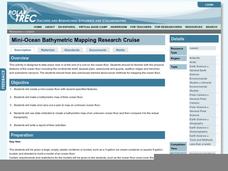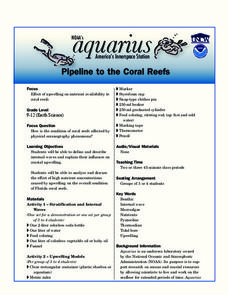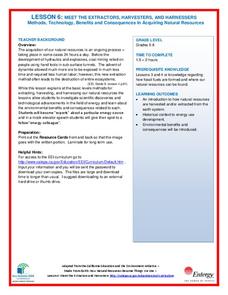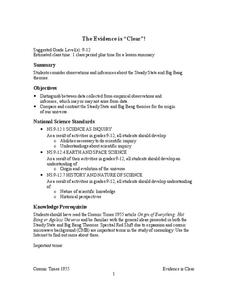LABScI
Acoustics: The Sound Lab
If the delay between a sound and its echo is less than 1/10th of a second, the human ear can’t distinguish it. Through the use of a Slinky, rubber band guitar, and straws, scholars explore where sound comes from and how it travels. Whole...
LABScI
Potential and Kinetic Energy: The Roller Coaster Lab
Ron Toomer, a famous roller coaster designer, suffered from motion sickness. Pupils design their own roller coasters, learning about potential and kinetic energy in the process. Labs focus on the importance of drop height, energy...
University of Wisconsin
Rain Garden Species Selection
The activity really comes to life within its intended unit on starting a rain garden. Working in groups, participants research native plants and coordinate them with the conditions in the designated garden area. Give the class access to...
University of Wisconsin
Bimodel Botany Bouquet
Gardeners are given an individual plant specimen from a bouquet of local rain garden plants. They group up by their plant type and then make observations together, name the plant, and introduce it to the rest of the class. You then share...
University of Wisconsin
Getting the Word Out
An appropriate way to celebrate and conclude the construction of a rain garden is to share it with the community. Small groups collaborate to design an outreach product such as a PowerPoint presentation, brochure, or poster, to draw...
Curated OER
Keying Rocks
Young geologists learn how to use an identification key in order to classify rocks. The key is designed to help them classify rocks into three types: ignesous, metamorphic, and sediimentary. After an initial teacher-led demonstration,...
Mary Pope Osborne, Classroom Adventures Program
Mummies in the Morning Egyptian pyramids, hieroglyphics
Visit the Magic Treehouse and take your class on a trip through time with a reading of the children's book Mummies in the Morning. Using the story to spark an investigation into Egyptian culture, this literature unit engages...
Tech Museum of Innovation
Analogous Models
What goes into a museum display? A secondary-level STEM project prompts groups to design a museum display for the Tech Museum of Innovation. They create an analogous, interactive model illustrating a science concept to complete the lesson.
Polar Trec
Mini-Ocean Bathymetric Mapping Research Cruise
Middle or high schoolers transform into oceanographers in a week-long simulation. To begin, each group follows directions to create a model of the ocean floor with specified features. Next, the groups prepare to set sail on a research...
Florida International University
Pipeline to the Coral Reefs
Discover firsthand the effects of internal waves on coral reefs. Through a series of experiments, learners simulate internal waves and upwelling events as they make observations on the movement of water and other debris. They then...
Florida International University
Design Your Own
Apply scientific principles to designing an experiment to study organisms living on the coral reef in our oceans. Through reading, individuals learn about the coral reef ecosystem and important factors that affect its function. Using the...
US Environmental Protection Agency
Non-Point Source Pollution
Investigate the different types of pollution that storm drain runoff carries into oceans, lakes, rivers, and streams with this class demonstration. Using an aquarium and an assortment of everyday items that contaminants like motor oil,...
Science 4 Inquiry
Edible Plate Tectonics
Many people think they can't observe plate tectonics, but thanks to GPS, we know that Australia moves at a rate of 2.7 inches per year, North America at 1 inches per year, and the Pacific plate at more than 3 inches per year! Scholars...
Science 4 Inquiry
Rocks Makin' Rocks: Rock Cycle Simulation
Scholars review prior knowledge before completing a hands-on simulation of the rock cycle. They write stories or songs summarizing their simulations to demonstrate mastery.
Curated OER
Radiation Comparison Before and After 9-11
Using the NASA website, class members try to determine if changes could be detected in cloud cover, temperature, and/or radiation measurements due to the lack of contrails that resulted from the halt in air traffic after the attacks of...
Laboratory for Atmospheric and Space Physics
A Classroom Solar System
Create a scaled model of our solar system in your classroom! Scholars work collaboratively to build paper mache planets and hang them in their proper position to showcase each planet's location in the solar system.
National Wildlife Federation
Meet the Extractors, Harvesters, and Harnessers: Methods, Technology, Benefits and Consequences in Acquiring Natural Resources
There are advantages and disadvantages to all sources of energy; the trick is determining which one has the least impact! Part six in the series of 12 has learners further explore energy resources. After reading information about one of...
Curated OER
Pollution
Young ecologists investigate some of the many ways that human activities adversely affect the environment. After identifying the main types of pollution (air, water, soil), 3rd graders fill in a Venn Diagram by pasting cut-out pictures...
NASA
Lunar Plant Growth Chamber
Would astronauts be able to grow their food on the Moon? Teams research plant growth in order to design and build a growth chamber that will function on the lunar surface. They narrow down plant choices based upon their strengths and...
NASA
The Evidence is “Clear”!
Do you think you know better? Become a scientist and prove it. Scholars review the evidence for two different theories of the origins of the universe. They notice the empirical observations as well as the inferences to determine which is...
NASA
Tools to Study Tornadoes and Galaxies
Take your class on an intergalactic journey as they explore the galaxy and various meteorological events taking place in our atmosphere each day. Learners investigate electromagnetic waves and the Doppler Effect before gathering radar...
Curated OER
Communication Delay
Construct a maze in your classroom and have a blindfolded scientist act as a space rover, maneuvering unfamiliar terrain while another scientist plays commander. Classmates record the number of occurrences of the commander having to...
University of Connecticut
Building Your Own Biosphere
On September 26, 1991, four women and four men entered the scientific experiment, Biosphere 2; the doors were sealed for two years in order to study the interactions of a biosphere. In the activity, scholars explore biospheres by...
University of Georgia
Land Biomes Project
Challenge scholars to research a biome and create a presentation for the producers of Survivor to choose their ecosystem for the next season's show. The materials include outlines, worksheets, and grading rubrics for individuals as well...
Other popular searches
- Earth Science Lesson Plans
- Earth Science Lesson Nevada
- Science Earth Day Lessons
- 5e Lesson Plans Earth Science
- 5e Earth Science Lessons
- Earth Day Science Lesson Plans
- Earth Science Lessons Moon
- Free Earth Science Lessons

























